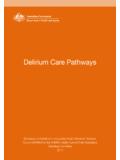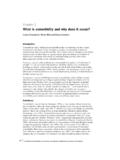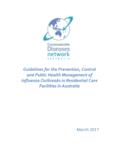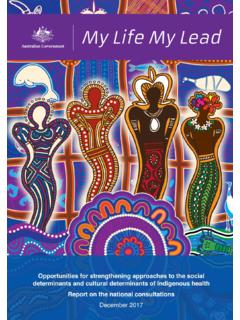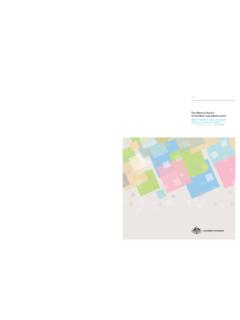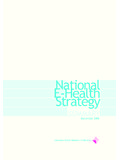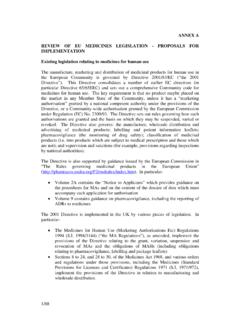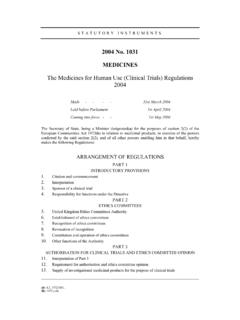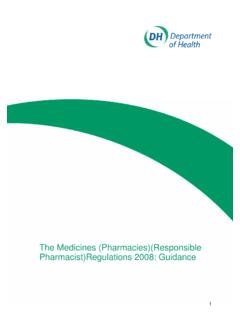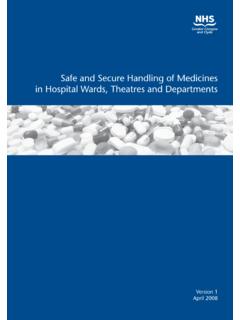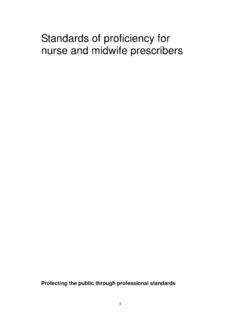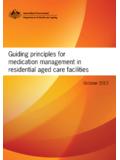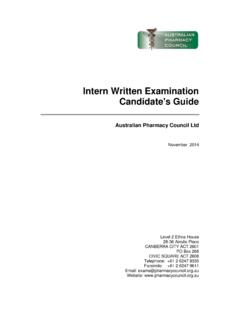Transcription of Guiding principles for medication management in …
1 Guiding principles for medication management in the community June 2006. Australian Pharmaceutical Advisory Council ISBN: 0 642 82937 3. Online ISBN: 0 642 82938 1. Publications Approval Number: 3844. Paper-based publications Commonwealth of Australia 2006. This work is copyright. Apart from any use as permitted under the Copyright Act 1968, no part may be reproduced by any process without prior written permission from the Commonwealth. Requests and inquiries concerning reproduction and rights should be addressed to the Commonwealth Copyright Administration, Attorney-General's Department, Robert Garran Offices, National Circuit, Barton ACT. 2600 or posted at Internet sites Commonwealth of Australia 2006. This work is copyright. You may download, display, print and reproduce this material in unaltered form only (retaining this notice) for your personal, non- commercial use or use within your organisation. Apart from any use as permitted under the Copyright Act 1968, all other rights are reserved.
2 Requests and inquiries concerning reproduction and rights should be addressed to Commonwealth Copyright Administration, Attorney-General's Department, Robert Garran Offices, National Circuit, Barton ACT 2600 or posted at Further copies of this publication can be obtained from the APAC Secretariat: Postal adress: MDP 38. GPO Box 9848. Canberra ACT 2601. Phone: (02) 6289 7753. Fax: (02) 6289 8641. Email: Website: . Contents 1. Purpose and Consent to medical treatment, decision-making and impaired Privacy Future Guiding Implementation Guiding Principle 1 Information 12. Guiding Principle 2 19. Guiding Principle 3 Dose Administration Guiding Principle 4 Administration of medicines in the Guiding Principle 5 medication Guiding Principle 6 medication 31. Guiding Principle 7 Alteration of oral Guiding Principle 8 Storage of Guiding Principle 9 Disposal of Guiding Principle 10 Nurse-initiated non-prescription Guiding Principle 11 Standing Guiding Principle 12 Risk management in the administration and use of medicines in the FURTHER READING AND 51.
3 STATE AND TERRITORY CONTACTS FOR REGULATORY AND POLICY III. Acknowledgements This publication was developed by the Australia Pharmaceutical Advisory Council and funded by the Australian Government Department of Health and Ageing. Many people contributed to the development of this document and we would like to thank the following organisations, which includes those that participated on the APAC. working party and those that provided comment during the consultation period. ACT Health Aged and Community Services Association NSW. Aged and Community Services Australia Alphalink Australian Council of Community Nursing Australian Council on Social Service Australian Divisions of General Practice Australian Government Department of Health Australian Government Department of Veterans' Affairs Australian Medical Association Australian Nursing Federation Australian Nursing Homes and Extended Care Association Ltd Complementary Healthcare Council of Australia Consumers' Health Forum Council on the Ageing / National Seniors Australia Dandenong District Division of General Practice Department of Health, South Australia Department of Health and Community Services, Northern Territory Department of Health and Human Services, Tasmania Department of Human Services.
4 Victoria Evans Community Options Project Federation of Ethnic Communities' Council of Australia Home Care Services National Diabetes Strategies Group IV Guiding principles for medication management in the community National Prescribing Service Ltd New South Wales Health Pharmaceutical Society of Australia Pharmacy Guild of Australia Queensland Health Queensland Nursing Council Royal Australasian College of Physicians Royal College of Nursing, Australia Royal District Nursing Services St Luke's Nursing Service . Introduction Australia's National Medicines Policy aims to meet medication and related service needs, so that both optimal health outcomes and economic objectives are The policy has four central objectives, including the quality use of medicines (QUM). QUM means selecting management options wisely, choosing suitable medicines if a medicine is considered necessary, and using those medicines safely and The term medicine' includes prescription and non-prescription medicines, including complementary health care The National Medicines Policy advocates a partnership approach to promoting its objectives, recognising that governments Australian, state and territory health educators, health practitioners, and other health care providers and suppliers, the medicines industry, health care consumers, and the media have accepted a shared responsibility in this endeavour.
5 While medicines make a significant contribution to the treatment and prevention of disease, increasing life expectancy and improving the quality of life, they also have the potential to cause harm. It has been shown that inappropriate or incorrect use of medicines can have an adverse effect on health. The quality use of medicines can have a positive impact on health and can improve quality of life. 1. Commonwealth Department of Health and Ageing (2000). National Medicines Policy. 2. Commonwealth Department of Health and Ageing (2002). The National Strategy for Quality Use of Medicines. background . Background The Australian Pharmaceutical Advisory Council (APAC) is a consultative forum that brings together key stakeholders from the medical, nursing and pharmacy professions, as well as industry, consumers and government, to advise the Australian Government Minister for Health and Ageing on medicines policy. APAC's mission is to develop, promote, influence and assist in the implementation of the National Medicines Policy in Australia, using a partnership approach to do so.
6 APAC has been addressing matters related to medication management for older people for some years. In 1997, APAC released guidelines for medication management in residential aged care facilities to address concerns in the residential aged care setting. The first two editions of APAC's Integrated best practice model for medication management in residential aged care facilities raised awareness about the quality use of medicines in residential aged care facilities and how a multi-disciplinary approach can improve health outcomes for residents. The 2002 review of these guidelines saw them renamed as Guidelines for medication management in residential aged care facilities. After the third edition of the guidelines was disseminated in 2003, and in line with APAC's mission, APAC agreed that similar guidelines were needed for medication management in the community. It established the APAC Community Care Working Party to develop Guiding principles for medication management in the community.
7 The working party included representatives from the medical, nursing and pharmacy professions, consumers, the Department of Health and Ageing, state governments, and the aged and community care industry. Users of these Guiding principles for medication management in the community should be aware of the links with APAC's recently revised Guiding principles to achieve continuity in medication management and the Guidelines for medication management in residential aged care facilities and refer to them as needed. Purpose and scope Consistent with the approach of the National Medicines Policy, these Guiding principles recognise that partnerships are important when support is being provided to consumers at home. They should include a range of health and community care providers. The Guiding principles aim to: promote the quality use of medicines and better medication management in the community assist service providers in developing or evaluating policies and procedures support those involved in assisting consumers Guiding principles for medication management in the community support consumers in managing their medicine(s).
8 Guide health care professionals in developing and evaluating professional standards. Health care professionals and care workers have a duty of care' to the people they support, care for, or advise. They must act reasonably to avoid foreseeable risk of injury, whether or not there are policies, guidelines or protocols relevant to the circumstances. When determining whether there has been a breach in duty of care, the standard of care that should have been provided will be considered. Employers should be aware of their employees' levels of skill and knowledge, and provide the necessary training to ensure duty of care is met. They should not expect employees to perform tasks beyond their knowledge, skills, experience and training. Employees should consider their own skills, experience, knowledge and limitations and inform employers if they do not understand or feel competent in performing any procedures. Guiding principles for medication management in the community setting are essential, given the increasing numbers of people on complex medication regimens in their own homes.
9 The Guiding principles focus on older people as they are the greatest users of medicines, and more older people are living in the community. These Guiding principles are intended only as a Guiding document. They are not prescriptive. The document sets out recommended parameters and procedures for medication management in the community. These Guiding principles do not replace existing State or Commonwealth legislation. Service providers and health care professionals should refer to government, organisational and relevant health care professional policies on medication administration. The Guiding principles target paid health and community care service providers who support older people in managing their medicines in their home and in the community. They could also be used by other community-based services, such as those supporting people with disabilities or chronic disease. The Guiding principles could also be used by the following groups: consumer organisations service providers, including community care providers health care professionals professional organisations, including regulatory authorities educational organisations governments Australian, state, territory and local consumers, carers and volunteers.
10 It is recommended that community-based services such as respite centres and transitional care facilities use APAC's Guidelines for medication management in residential aged care facilities. background . These Guiding principles may not be applicable in all rural and remote settings as they may not address the complexities in these settings. However, the Guiding principles are broad and could help in establishing best-practice policies and procedures for medication management in these settings. Specific references have been made to Aboriginal and Torres Strait Islander health in some of the Guiding principles . For example, Aboriginal Health Workers, Torres Strait Islander Health Workers and Aboriginal Medical Services are mentioned with respect to preparation of Dose Administration Aids ( Guiding Principle 3), and Aboriginal Health Workers are recognised as having an important role in the administration of medicines ( Guiding Principle 4).
